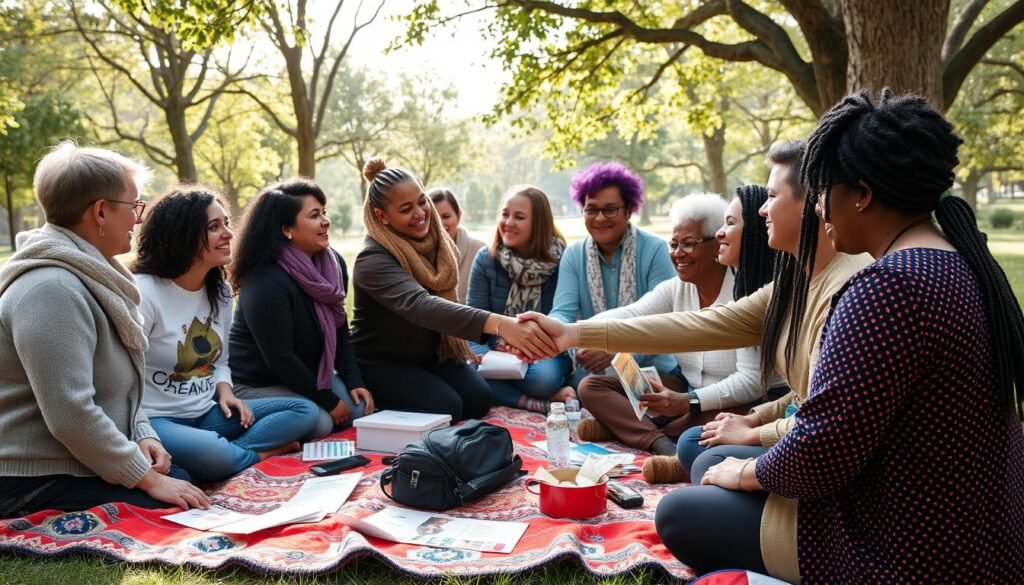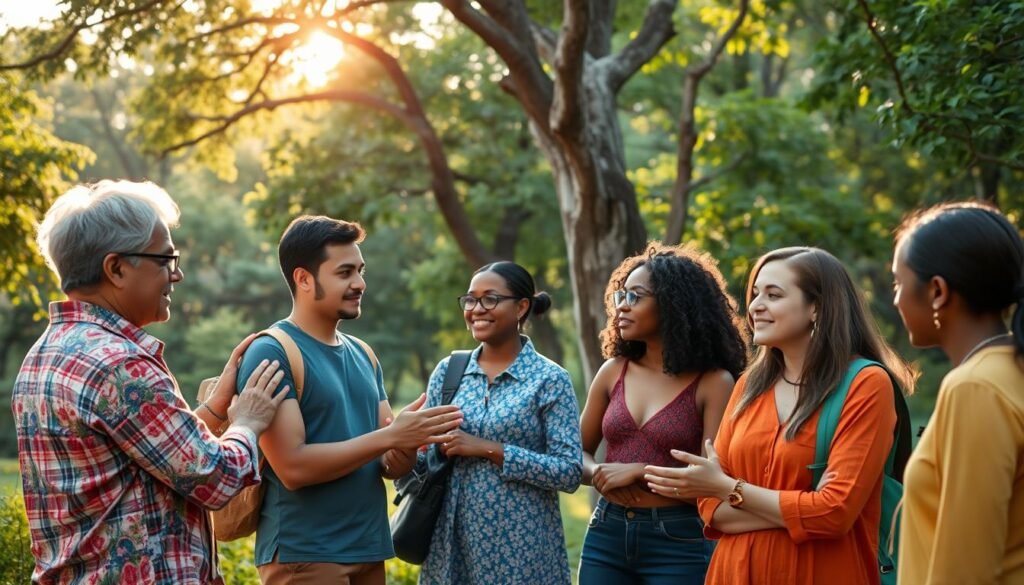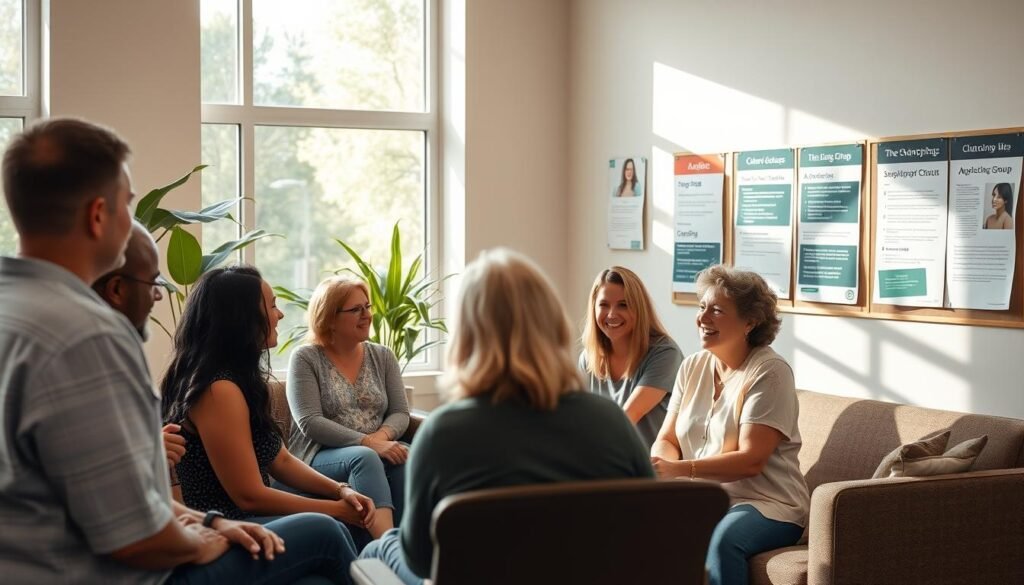Did you know about 2% of people worldwide have some form of alopecia? This significant number shows how common alopecia is. It reminds us why it’s vital to find a community for support. Joining alopecia support groups can be life-changing. It offers folks understanding and helpful tips for their journey.
The road for those with alopecia can feel lonely. But by creating ties with others, they find power in shared stories. This piece will share tips on how to find strong support networks. Whether you’re looking locally or online.
Key Takeaways
- Approximately 2% of the global population is impacted by alopecia.
- Building connections through support groups is crucial for emotional well-being.
- Community support can help alleviate feelings of isolation.
- Effective networking strategies can lead to meaningful support groups.
- Resources are available both locally and online for finding support.
Understanding Alopecia and Its Impact
Alopecia is when people lose their hair. It comes in various forms, each with its own set of challenges. The emotional side of alopecia can deeply affect one’s mental health and how they see themselves. Knowing about the different kinds of alopecia and their emotional impact helps those affected and their supporters cope better.
Types of Alopecia
Different kinds of alopecia have specific patterns and reasons:
- Alopecia Areata: This type causes sudden patches of hair to fall out. It happens when the body’s immune system attacks the hair follicles by mistake.
- Alopecia Totalis: This severe form leads to losing all scalp hair.
- Alopecia Universalis: The most severe type, causing loss of all body hair.
- Androgenetic Alopecia: Also known as pattern baldness, it’s linked to genes and hormonal changes over time.
Emotional and Psychological Effects
Dealing with alopecia brings several emotional challenges. People may face anxiety, depression, and a hit to their self-esteem due to changes in how they look. The impact can touch every part of life, including relationships and work. Support from loved ones and professionals is crucial for overcoming these challenges.
| Type of Alopecia | Description | Common Psychological Effects |
|---|---|---|
| Alopecia Areata | Patchy loss of hair, often sudden. | Anxiety, uncertainty about re-growth. |
| Alopecia Totalis | Complete loss of hair on the scalp. | Low self-esteem, social withdrawal. |
| Alopecia Universalis | Total loss of hair from the entire body. | Severe emotional distress, identity concerns. |
| Androgenetic Alopecia | Progressive hair thinning commonly associated with aging. | Frustration, fear of aging. |
What Are Support Groups?
Support groups are crucial for connecting and sharing personal stories, especially about tough situations such as alopecia. They help us understand the importance of support groups. People in these groups have similar experiences and give emotional support and advice.
Definition and Purpose
The main purpose of support groups is to help members feel they belong. They offer a place to talk openly, share how to cope, and get support from those who get it. Even though support groups differ, they all aim to connect and help members understand each other.
Benefits of Joining a Support Group
Being part of a support group has many key benefits for emotional health. The benefits of support groups include:
- Sharing your story with people who are in similar situations.
- Learning coping strategies that have helped others.
- Making lasting friendships with people who get what you’re going through.
- Finding out more about alopecia through educational resources.
Building Connections with Others Facing Alopecia
Connecting with others facing alopecia brings much-needed emotional support. Many feel alone in their struggle. By joining a support group, you can find meaningful connections. You’ll be able to share your experiences in a supportive space. This helps everyone feel understood and supported.
Importance of Shared Experiences
Sharing your story is key to healing. In support groups, members understand each other. This sense of community cuts down on loneliness. Talking with others who get it means you can share openly. This leads to growth and healing.
Networking Opportunities
Support groups offer more than just emotional help. They’re a chance to make new friends. And sometimes, these friendships become avenues for advocacy or even career opportunities. It shows why regular attendance matters. It helps your network and your heart grow.
How to Find Local Support Groups for Alopecia
Finding local support groups for alopecia is important. It helps people looking for community and understanding. Good search methods help connect with others who have similar stories.
Local resources offer emotional support. They make you feel like you belong.
Search Strategies for Local Groups
Here’s how to find support groups:
- Use online search engines to find groups close to you.
- Look on social media to connect with people in the community.
- Ask local health organizations about their programs.
These ways can help you find local groups for alopecia. You’ll get encouragement and insights. Keep searching online for new chances to connect.
Community Centers and Health Clinics
Community centers and health clinics are great places to look. They often have events about health and well-being. They help you meet people who understand what you’re going through. Local clinics might have info on support activities and resources for alopecia.
Community health resources work with groups like the National Alopecia Areata Foundation. This helps find groups that fit your needs. Connecting with others gives you strength and resilience.
| Resource Type | Examples | Contact Method |
|---|---|---|
| Community Center | Local Youth and Family Services | Phone or In-Person Visit |
| Health Clinic | Neighborhood Health Services | Email or Patient Portal |
| Online Platforms | Meetup.com, Facebook Groups | Website Registration |
Using these strategies and resources can help find the right support group. This group will match your experiences with alopecia.
Online Support Groups for Alopecia
Today, online support groups offer valuable help for those with alopecia. They let people connect with others who understand their situation, no matter where they are. These virtual groups are more than just convenient. They make it easier to reach different communities and create meaningful friendships.
Benefits of Virtual Support
Joining online support communities has many perks:
- Accessibility: People with alopecia can find support without leaving home.
- Diverse Perspectives: You can hear many viewpoints by talking to a variety of people.
- Anonymity: Online groups let you share feelings freely, without judgment.
- Flexible Participation: You can take part in discussions whenever you like, making it easy to fit into your schedule.
Popular Online Platforms
There are many places online where people with alopecia can find community:
- Facebook Groups: Here, you can share stories, advice, and encouragement with others.
- Reddit: It has subreddits for open talks and sharing helpful resources about alopecia.
- Alopecia World: This website is a dedicated space for connecting and supporting those affected by alopecia.
Networking Strategies for Individuals with Alopecia
Finding the right support for alopecia is crucial. It helps to connect and share with others who understand. Social media is key in finding these support circles. It lets people find groups that get what they’re going through.
Leveraging Social Media
People with alopecia are turning to social media for support. Sites like Facebook and Instagram have many groups for discussing alopecia. They share advice and offer support. These online communities help people feel like they belong. They allow for open talks about hair loss. Here, individuals can share their stories and learn how to cope. They meet others facing the same struggles.
Joining Related Forums and Communities
Joining forums on alopecia can really help. These sites offer tons of information and support. They’re a place to ask questions and get advice. People there understand what it’s like to lose hair. There are also tips on topics like dating with alopecia. This can help those feeling stressed. For advice on sharing your alopecia story, click here.

Professional Networking for Healthcare Providers
Creating a strong network among healthcare providers is crucial for helping individuals with alopecia. This network encourages teamwork and allows specialists to collaborate more effectively. By connecting with dermatologists and mental health experts, providers can deliver holistic care.
Connecting with Specialists
It’s important for healthcare providers to build relationships with specialists. They should look for chances to meet these professionals at events and online. This helps them learn more and makes it easier to refer patients, improving the care for alopecia.
Fostering Relationships with Local Health Providers
Having a good network with local health providers improves patient care. Providers should work with doctors, nutritionists, and counselors for better treatment plans. They can use meetings and events to build these links. Good professional networking means better communication and referrals to specialists, improving patient care.
Communication Skills for Building Connections
Want to create meaningful connections? Start with effective communication skills. They’re key for people dealing with challenges like alopecia. Improving how we interact boosts both personal and work relationships.
We should focus on knowing how we feel and sharing those feelings right. It’s also about understanding others. This builds trust, making connections easier to start and keep.
Improving Interpersonal Skills
Boosting interpersonal skills means valuing nonverbal cues, building rapport, and being assertive. Being open in conversations helps us understand better. It makes sharing experiences easier.
Being empathetic helps us connect on a deeper level. We get what others feel and see their point of view.
Active Listening Techniques
Active listening is vital for great communication. It means fully focusing on the speaker, responding well, and remembering what’s said. Here are some ways to listen better:
- Maintaining eye contact to show attentiveness.
- Paraphrasing what the speaker has said to confirm understanding.
- Avoiding interruptions, allowing the speaker to express themselves fully.
- Asking open-ended questions to encourage further dialogue.
Using these listening tips can improve your connection skills. For more on how communication helps relationships, visit this resource.

| Skill | Description | Impact on Communication |
|---|---|---|
| Empathy | The ability to understand and share the feelings of others. | Fosters trust and connection in conversations. |
| Assertiveness | Expressing oneself in a confident manner while respecting others. | Encourages open dialogue and clarity in relationships. |
| Active Listening | Fully focusing on the speaker and responding appropriately. | Enhances understanding and strengthens bonds. |
Participating in Alopecia Awareness Events
Joining alopecia awareness events is crucial for those impacted by the condition. These events not only spread awareness but also offer support and education. They are great places to find resources and connect with others who understand.
Finding Events in Your Area
Looking for local events related to alopecia awareness is easy with the right tools. Start by checking listings in your community and on national event calendars. The National Alopecia Areata Foundation website is a great place to find event schedules. Local health clinics and community centers also often host such events.
Making Meaningful Connections at Events
Creating connections at these events is key to building strong relationships. You can meet others who are dealing with the same issues. This can lead to friendships that help you feel less alone.
Being a part of these events allows you to engage in meaningful discussions. You can share stories, discuss treatments, and work on projects together. This strengthens the sense of belonging among attendees.
Attending these events helps build a supportive network for people with alopecia. Talking and participating in activities emphasizes the value of community support. This can make managing alopecia much easier.
| Event Type | Location | Date | Contact |
|---|---|---|---|
| Alopecia Awareness Walk | City Park Community Center | May 15, 2024 | (123) 456-7890 |
| Support Group Meet-Up | Downtown Wellness Center | June 10, 2024 | (234) 567-8901 |
| Educational Seminar | Local Library Conference Room | July 20, 2024 | (345) 678-9012 |
Resources for Finding Support Groups
Finding support groups greatly benefits those with alopecia. It helps to know where to find assistance. There are many national and local resources ready to help.
National Organizations
Many national groups offer aid and connection for people with alopecia. The National Alopecia Areata Foundation has resources, educational materials, and a database to find support groups. The American Academy of Dermatology shares information on hair loss, including alopecia. It’s wise to check these organizations for support.
Local Community Resources
Look into local health departments, clinics, and non-profits for help with alopecia. They have support groups, counseling, and workshops on coping. Getting involved with local resources helps find the right support network. This leads to meaningful experiences and a sense of community.

Conclusion
Making friends is key for people dealing with alopecia troubles. This article shows it’s more than sharing stories. It’s about making a community and feeling you belong. People with alopecia have many ways to meet others like them, both near them and online.
Joining support groups, going to awareness events, and using online sites offer great help. These activities help people find understanding and emotional support. They also help in making friends who support them on their journey. It’s comforting to know there’s help for alopecia, making one feel less alone.
The journey of making connections offers chances for personal growth and better understanding. By seeking out and welcoming community, individuals turn their alopecia challenge into a journey of staying strong together. This journey shows they are not fighting alone.